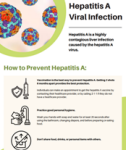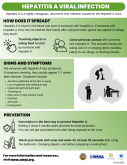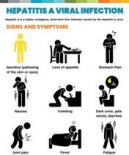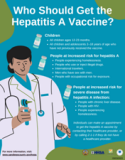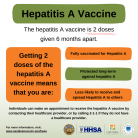Hepatitis A
Page last updated 1/7/2026.
The County of San Diego is committed to ensuring residents continue to have access to safe and effective vaccines that are based on credible, transparent, and science-based evidence. In alignment with the West Coast Health Alliance and other leading medical, health, and patient advocacy groups, we follow the American Academy of Pediatrics (AAP) Recommended Child and Adolescent Immunization Schedule.
Hepatitis A is a highly contagious infection that can affect the liver. See below, or click the following links, to learn more about:
-
The best way to prevent hepatitis A is by
getting the hepatitis A vaccine. The following people should
get the hepatitis A vaccine:
-
Children
- all children ages 12-23 months, or
- all children and adolescents 2-18 years of age who have not previously gotten the hepatitis A vaccine.
-
People at increased risk for hepatitis A such as:
- international travelers,
- men who have sex with men,
- people who use or inject drugs,
- people whose jobs increase the risk of exposure,
- people who plan to adopt internationally, and/or
- people experiencing homelessness.
-
People at increased risk for severe disease such as:
- people with chronic liver disease, including hepatitis B and hepatitis C, and
- people with HIV.
- Others recommended for vaccination, including pregnant people at risk for hepatitis A and any person who requests vaccination.
-
Children
- People who have been exposed to HAV should talk to their medical provider. They can give a single shot of the hepatitis A vaccine within 2 weeks of exposure to help prevent sickness.
- Practice good hygiene, such as washing your hands after using the bathroom, caring for someone who is sick with hepatitis A, changing diapers, and before preparing or eating food.
Where can I get the Hepatitis A vaccine?
- Contact your healthcare provider. If you do not have a healthcare provider, contact 2-1-1.
- Immunization services are available throughout San Diego County at our six Public Health Center Locations. Please visit our Immunization Clinic Locations for clinic hours of operation. We recommend calling the site you plan to visit to confirm current hours and immunization availability.
Hepatitis A is spread when someone ingests the virus, even in very small amounts. This usually occurs through person-to-person contact or by eating or drinking contaminated food.
Not everyone with hepatitis A has symptoms. If symptoms develop, they can appear 2 to 7 weeks after exposure. Symptoms can last less than 2 months, although some people can feel sick for as long as 6 months.
Symptoms can include:
- Dark urine (pee) or light-colored stools (poop)
- Diarrhea
- Feeling tired
- Fever
- Joint pain
- Loss of appetite (not wanting to eat)
- Nausea, stomach pain, throwing up
- Yellow skin or eyes (jaundice)
A person can begin spreading hepatitis A up to two weeks before symptoms begin. People can even spread the hepatitis A virus even if they do not have symptoms.
- A medical provider can review symptoms and order a blood test to determine if someone has hepatitis A.
- Although there is no cure for hepatits A, medical providers usually recommend resting, eating a well-balanced diet, and making sure to get enough fluids to help treat symptoms.
County of San Diego
Hepatitis A Prevention Poster
English | معلومات باللغة العربية (Arabic) | 中文信息 (Chinese) | 한국어 정보 (Korean) | Español (Spanish) | Impormasyon sa Tagalog (Tagalog) | Thông Tin Bằng Tiếng Việt (Vietnamese)
Hepatitis A Viral Infection Fact Sheet:
English | معلومات باللغة العربية (Arabic) | 中文信息 (Chinese) | 한국어 정보 (Korean) | Español (Spanish) | Impormasyon sa Tagalog (Tagalog) | Thông Tin Bằng Tiếng Việt (Vietnamese)
Hepatitis A Symptoms Poster:
English | معلومات باللغة العربية (Arabic) | 中文信息 (Chinese) | 한국어 정보 (Korean) | Español (Spanish) | Impormasyon sa Tagalog (Tagalog) | Thông Tin Bằng Tiếng Việt (Vietnamese)
Who Should Get the Hepatitis A Vaccine Flyer
English | معلومات باللغة العربية (Arabic) | 中文信息 (Chinese) | 한국어 정보 (Korean) | Español (Spanish) | Impormasyon sa Tagalog (Tagalog) | Thông Tin Bằng Tiếng Việt (Vietnamese)
The Hepatitis A Vaccine is 2 Doses Flyer
English | معلومات باللغة العربية (Arabic) | 中文信息 (Chinese) | 한국어 정보 (Korean) | Español (Spanish) | Impormasyon sa Tagalog (Tagalog) | Thông Tin Bằng Tiếng Việt (Vietnamese)
-
Department
of Environmental Health and Quality
- Hepatitis A Guidance for Food Facilities
- Hepatitis A Disinfection Guidelines: English | Spanish | Arabic | Chinese | Farsi | Filipino/Tagalog |
Korean | Somali | Vietnamese
- Chronic Liver Disease Hepatitis A Fact Sheet
- Hepatitis A Vaccinations for Food Handlers: Arabic | English | Farsi | Spanish
Centers for Disease Control and Prevention
- Hepatitis A Vaccination Reminder for Healthcare Providers (February 16, 2023)
- Clinical Care of Hepatitis A
California Health Alert Network San Diego Communications
For more information, contact the Epidemiology Unit at (619) 692-8499 or send us an e-mail.





